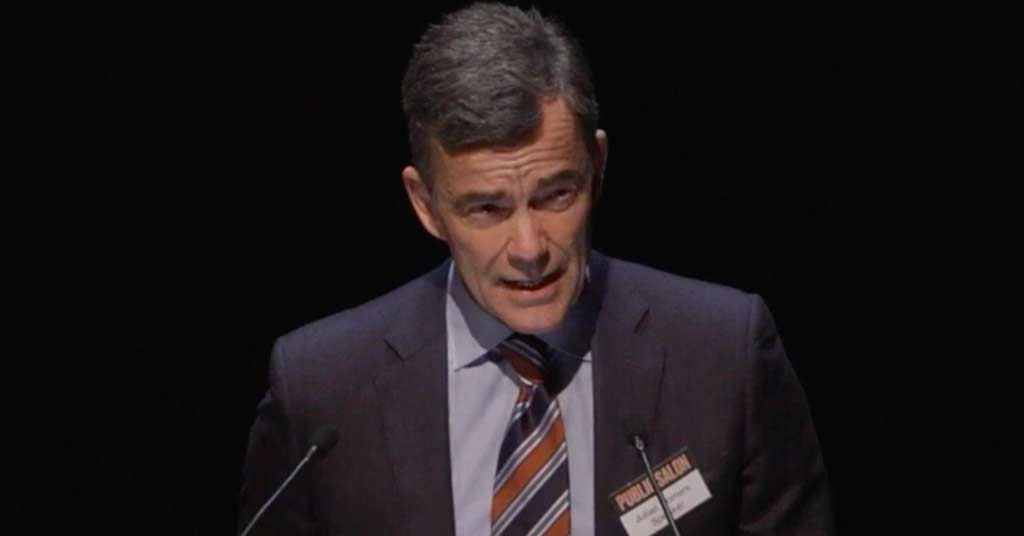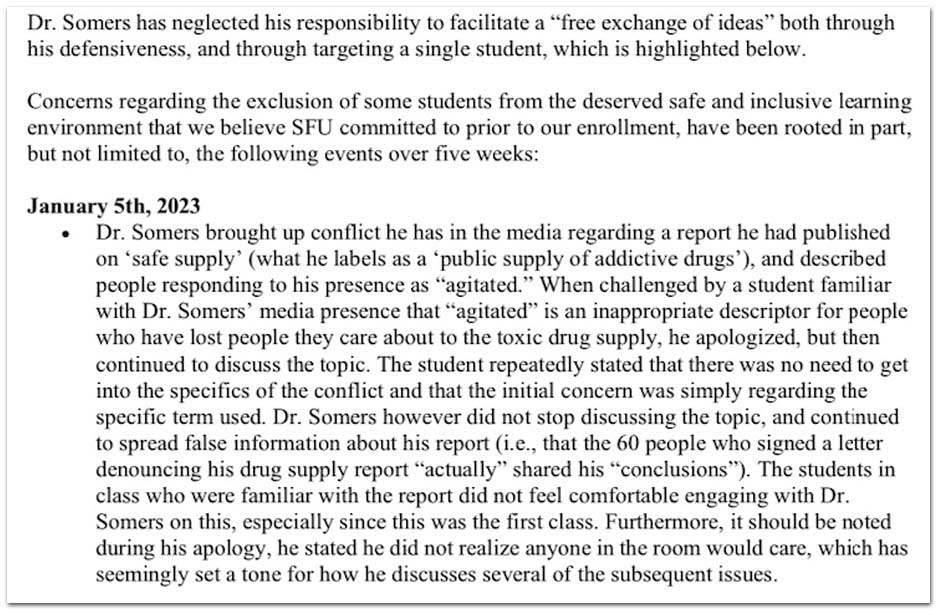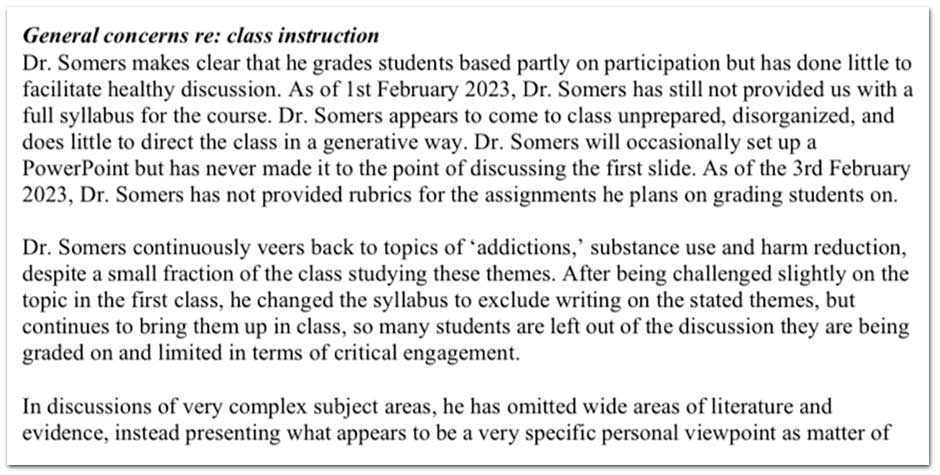
Professor Who Claimed BC Government Censored Him Faces Complaints From Grad Students
Students and faculty raise concerns after a Simon Fraser University course taught by professor Julian Somers descends into chaos
Graduate students at Simon Fraser University are voicing concerns about a controversial professor after their grad course descended into chaos – but the outspoken critic of safe supply policies claims students and faculty are out to get him.
The chaos began with a story in the National Post that quoted the professor claiming he was a victim of censorship by British Columbia’s government all because he criticized the province’s safe supply policies.
The National Post claims an academic was ‘censored’ for criticizing BC’s ‘safe supply’ policy.
That’s not quite accurate.https://t.co/IVpV2qcpXd #bcpoli #vanpoli
— PressProgress (@pressprogress) January 9, 2023
According to a letter to SFU’s Faculty of Health Sciences signed by over a dozen PhD and MSc students newly obtained by PressProgress, grad students allege a class taught by professor Julian Somers got off to the wrong start last month when he brought up his National Post story during the first class and started arguing with students.
The National Post story, which claimed Somers had been “silenced” by BC’s government for criticizing safe supply policies, was retweeted by right-wing figures, including Pierre Poilievre and Jordan Peterson.
The letter alleges Somers, who is an outspoken critic of safe supply and has ties to the recovery industry, “neglected his responsibility to facilitate a free exchange of ideas” and even engaged in “bullying” by “targeting a single student.”
“We write this non-exhaustive letter after five weeks of class and coursework, through which Dr. Somers has displayed a pattern of behaviours and conduct which have created a space in which we feel unwelcome, unsafe, anxious and unable to learn,” the letter states. “From our perspective, his pedagogical approach has been unprofessional, unprepared and disorganized.”
Students say they requested that the faculty allow them to drop the course taught by Somers, which is mandatory as part of their degree, without experiencing any impact to the completion of their program.

Letter from Simon Fraser University students about Julian Somers
In a statement, Somers said he had “not seen any letter” and insisted “none” of the points raised in the letter are “accurate.”
“Your emails constitute harassment and I will not respond further,” Somers told PressProgress in a statement that he CC’d to a dozen SFU faculty members. Somers said he suspects a number of his own students and fellow faculty members have ulterior motives.
“Several of the students in my current seminar are supervised by faculty members who have publicly protested my research criticizing a public supply of addictive drugs,” Somers stated. “None of those faculty members responded to my emails requesting dialogue, including messages that were sent before our report on PSAD was finalized.”
“In the very first class I was advised by students that they would be seeking ways to publicly criticize me and disrupt my contributions to public dialogue.”
Somers added that any student that has an issue with him should “raise concerns with me directly.”
SFU’s Faculty of Health Sciences would not comment on whether it received the letter, but told PressProgress “the university works with students to address their concerns, and when needed, to accommodate students with alternate arrangements that maintain the continuity of their studies.”
Allegations contained in the letter echo Somers’ own statements about other faculty taking issue with his research. Students claimed Somers referenced his media appearances, particularly a report he published on safe supply, which he calls the “public supply of addictive drugs.”
That report, which was commissioned by Alberta UCP MLAs, was publicly condemned by a number of experts who signed an open letter criticizing Somer’s methods and called his research of “poor quality.”
Students allege Somers “spread false information about his report” in class and claimed that the “60 people who signed a letter denouncing his drug supply report ‘actually’ shared his ‘conclusions’.”
“The students in class who were familiar with the report did not feel comfortable engaging with Dr. Somers on this, especially since this was the first class.”

Letter from Simon Fraser University students about Julian Somers
Other sections of the letter allege Somers created a “toxic and hostile” learning environment, dedicated “class time” to “harmful conspiracy theories” and repeatedly suggested his classroom discussions are held under “Chatham House Rule.”
Although Somers claims “no student has advised me that they wish to drop the class,” that claim is disputed by a former student who said they dropped the class following his comments about drug users and people with mental illness.
“We were allowed to withdraw from the course, whoever was interested in doing so was given the option, and I feel like that was a fair remedy for our cohort,” the student told PressProgress.
“It started to get bad when he was making comments in class that were pretty stigmatizing about people with mental illness, people with substance use problems,” they said.
Somers’ former students requested to be kept anonymous for fear of facing academic recourse.
“He frequently refers to people who use drugs as addicts — online on his social media presence, but also in class, he would refer to people as addicts, which is just not the terminology that he should be using as an academic,” they said.
They added that he often attempted to appear “naive” about his frequent presence in the media, including concerns that have been raised about him in the past.
“The biggest concern for myself, and this is generally shared I would say in the cohort and previous cohorts, is that he’s mischaracterizing his research. He’s done that a couple of times now, and so he’s not demonstrating sound, ethical practice as a senior researcher,” they added.

Letter from Simon Fraser University students about Julian Somers
“He’s a distinguished prof in our department, he’s not going anywhere. There’s a lot of favoritism happening within the Faculty towards him that I think is really unfair to students. And I think it’s just irresponsible in general.”
“It’s been ongoing. And that’s part of the frustrating part as well, that there feels like there’s not a lot of respect happening for students and student voices are being suppressed a lot on this matter.”
Another student in the program says that Somers created a “toxic and hostile environment” and even targeted them several times.
“This includes once seemingly targeting me as a student, saying my name without warning several times in a rant that included a private email exchange we had previously had,” Tyson Singh Kelsall told PressProgress.
“I am aware of complaints stemming from three separate classes.”
Somers’ name was most recently listed as endorsing a recovery oriented approach to care shared by BC Liberal Leader Kevin Falcon.
The plan cites a report put out by SFU’s Centre for Applied Research in Mental Health and Addiction (CARMHA), of which Somers is chair.
However, a professor who is an expert in substance use and harm reduction, who has asked to remain anonymous, says that there is a “mismatch” between the way Somers is representing his work publicly, and what the studies actually show.
“There seems to be an issue here, in terms of the mismatch between the claims being made, and the evidence that’s cited in support of those claims. And I think that’s concerning,” said the professor.
When it comes to the plan being cited by the BC Liberals, the professor said that the three citations used by Somers actually have nothing to do with safe supply.
“If you actually look at the citations, there’s three cited. The first one is a trial from the Housing First trial, which showed no impact on substance use and mental health outcomes. And the intervention was equivalent to treatment as usual at 12 months,” the professor said.
“The second two papers are actually descriptive papers describing the characteristics of individuals of Indigenous ancestry who participated in those trials. They’re not actually results or outcomes from the trial. So here, you have three citations in support of this claim that there’s these benefits, but the papers aren’t even outcome based, they don’t report on outcomes at all.”
The professor says that academics are expected to follow principles of scholarly integrity and report research results accurately.
“When someone repeatedly makes the claim that there’s this body of evidence supporting an intervention, and actually, the only evidence being cited is in support of a different intervention? Well, I think that’s a bit of a concern,” they added.
“Sadly, there are other instances where I think people really, really stretched the story and the narrative to make it fit a purpose.
The professor added that many of the reports being used by Somers to advance a particular narrative, and used by governments to justify policy, are not peer-reviewed, evidence based studies.
“The unfortunate thing is, is that anyone can cobble together a report and you can say just about anything you want.That’s very different from an article that goes through independent arm’s length anonymous peer review in a high quality medical journal.”
Another professor, with SFU’s Faculty of Health Sciences, said their faculty is concerned about the allegations outlined in the letter.
“Some faculty members are very concerned about the allegations and the impact on students, as well as the implications for the program.”
Our journalism is powered by readers like you.
We’re an award-winning non-profit news organization that covers topics like social and economic inequality, big business and labour, and right-wing extremism.
Help us build so we can bring to light stories that don’t get the attention they deserve from Canada’s big corporate media outlets.
Donate



